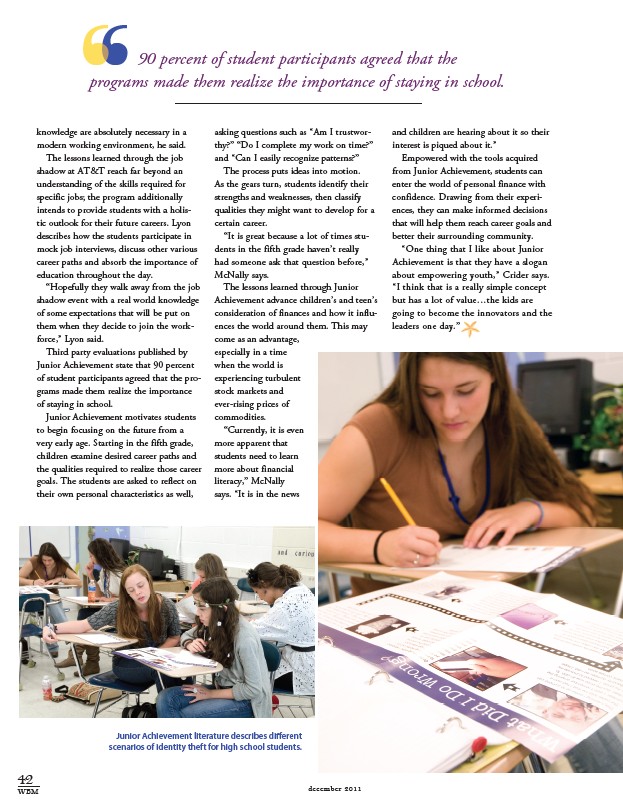
90 percent of student participants agreed that the
‘pr‘ograms made them realize the importance of staying in school.
knowledge are absolutely necessary in a
modern working environment, he said.
The lessons learned through the job
shadow at AT&T reach far beyond an
understanding of the skills required for
specific jobs; the program additionally
intends to provide students with a holistic
outlook for their future careers. Lyon
describes how the students participate in
mock job interviews, discuss other various
career paths and absorb the importance of
education throughout the day.
“Hopefully they walk away from the job
shadow event with a real world knowledge
of some expectations that will be put on
them when they decide to join the workforce,”
Lyon said.
Third party evaluations published by
Junior Achievement state that 90 percent
of student participants agreed that the programs
made them realize the importance
of staying in school.
Junior Achievement motivates students
to begin focusing on the future from a
very early age. Starting in the fifth grade,
children examine desired career paths and
the qualities required to realize those career
goals. The students are asked to reflect on
their own personal characteristics as well,
asking questions such as “Am I trustworthy?”
“Do I complete my work on time?”
and “Can I easily recognize patterns?”
The process puts ideas into motion.
As the gears turn, students identify their
strengths and weaknesses, then classify
qualities they might want to develop for a
certain career.
“It is great because a lot of times students
in the fifth grade haven’t really
had someone ask that question before,”
McNally says.
The lessons learned through Junior
Achievement advance children’s and teen’s
consideration of finances and how it influences
the world around them. This may
come as an advantage,
especially in a time
when the world is
experiencing turbulent
stock markets and
ever-rising prices of
commodities.
“Currently, it is even
more apparent that
students need to learn
more about financial
literacy,” McNally
says. “It is in the news
and children are hearing about it so their
interest is piqued about it.”
Empowered with the tools acquired
from Junior Achievement, students can
enter the world of personal finance with
confidence. Drawing from their experiences,
they can make informed decisions
that will help them reach career goals and
better their surrounding community.
“One thing that I like about Junior
Achievement is that they have a slogan
about empowering youth,” Crider says.
“I think that is a really simple concept
but has a lot of value…the kids are
going to become the innovators and the
leaders one day.”
Junior Achievement literature describes different
scenarios of identity theft for high school students.
42
WBM december 2011